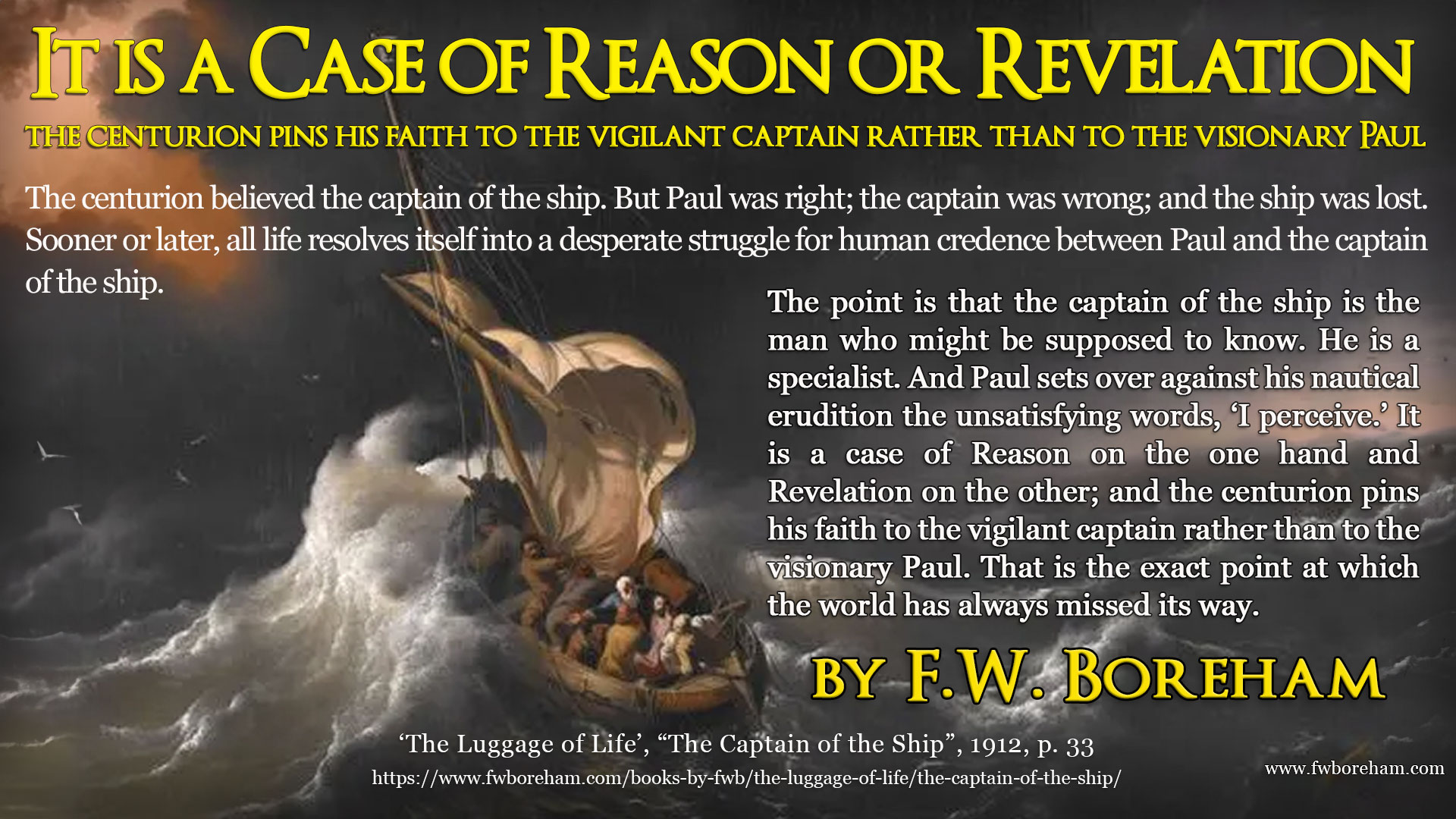home > books by FWB > THE LUGGAGE OF LIFE > 1.5 The Captain of the Ship
IV
THE CAPTAIN OF THE SHIP
THE unvarnished fact is that even the skipper does not know everything. He sweeps the horizon with his glasses, but there are signs in the sky that elude his wary observation. He may quite easily be beaten at his own game. The seer in the cabin may decipher the language of the clouds more accurately than the bronzed and weather-beaten mariner on the quarter-deck. That was the mistake the centurion made. ‘The centurion believed the master of the ship more than those things which were spoken by Paul.’ It is a purely nautical matter. The captain of the ship predicts fair weather and urges an early clearance. Paul, the prisoner and passenger, foretold angry seas, and advised remaining in shelter. The centurion believed the captain of the ship. But Paul was right; the captain was wrong; and the ship was lost. Sooner or later, all life resolves itself into a desperate struggle for human credence between Paul and the captain of the ship. The point is that the captain of the ship is the man who might be supposed to know. He is a specialist. And Paul sets over against his nautical erudition the unsatisfying words, ‘I perceive.’ It is a case of Reason on the one hand and Revelation on the other; and the centurion pins his faith to the vigilant captain rather than to the visionary Paul. That is the exact point at which the world has always missed its way. That was the trouble at the very start. Could it be that to eat of the fruit of the tree would be to die? Was it reasonable upon the face of it? And Adam believed the captain of the ship. Later Noah predicted a flood. Where were the phenomena to warrant such an alarming forecast? Did it appeal to common sense? And again the insistent voice of Revelation was scouted. Visit the melancholy sites of Edom and Babylon, of Tyre and Sidon, of Sodom and Gomorrah, of Greece and Rome, and everywhere, on crumbling pillar and broken arch, seeing eyes may discern these significant words, deeply graven on the ruins that are splendid even in decay: They believed the captain of the ship. These magnificent empire-builders of yesterday scouted the nebulous perceptions of the prophets, and they fell. National shipwreck always comes along that line.

It is wonderful how little the practical man really knows. A grey-headed old theorist is tapping away with his geological hammer among the stones and strata on the hill-side. As he leaves he remarks casually that there is coal in the mountain. The practical man smiles’ incredulously at the poor old fellow as he packs his hammers and glasses and specimens and strolls off home; but, a year or two later, when the hill-side is riddled with shafts, grimy with coal-dust, and black with smoke, the ‘practical man’ bites his lips in disgust at his failure to take the old dreamer’s hint. The meteorologist shuts himself up in his laboratory among phials and chemicals. Presently he opens his door and gravely predicts a storm. The masters of the craft down at the port smile knowingly and put to sea; but when their ships are in the pitiless grip of the gale they grimly remember the forecast. Only the other day Professor Belar, Director of the Larbach Observatory, warned miners of seismic unrest that seemed likely to liberate fire-damp. He was not taken very seriously; and within a day or two all Europe stood aghast at the horror of the Lancashire colliery explosion. Paul generally knows what he is talking about.
It would be an appalling calamity if we were left at the mercy of the captain of the ship. He may be true as steel, and good as gold, but, as in the case under notice, he makes mistakes. Those who are inclined, like the centurion, to trust the captain of the ship rather than those things that are spoken by Paul will do well to consult a second captain. There are more ships than one, and the opinion of the second captain will diverge from that of the first. Doctors differ. I have recently been reading the biographies of some of our greatest English judges, and few things are more curious than the way in which two distinguished judges, equally able and equally conscientious, will hear the selfsame evidence, and listen to the selfsame speeches, and then arrive at diametrically opposite conclusions. The same phenomenon is common in politics. Great and gifted men, trained to wrestle with the problems of political economy, developing by long experience all the instincts and functions of statesmanship, will divide sharply and oppose each other hotly on the most simple issues.
Clearly the captain of the ship is unreliable. In a world like this, on which so many worlds depend, it would be the climax of misfortune if the captain of the ship had it all his own way. There are visions, perceptions, revelations. God speaks from without. He speaks plainly, so that wayfaring men may not err. Paul rises and says grandly, ‘Sirs, I perceive…’ And that centurion is foolish indeed who believes the captain of the ship more than those things that are spoken by Paul. The dusty and travel-stained pilgrims of eternity would be of all men most miserable if, amidst the babel of many advisers, no clear guidance had reached them from the haven of their desire. Happily, the Lord of the Pilgrims does not leave His Christians and Hopefuls to find the way to the Celestial City as best they may. There are the ‘things spoken by Paul.’
Yet it must be admitted that there is a certain glamour and fascination about the captain of the ship. It is restful to believe him rather than to venture everything upon the verdict of a visionary. In one of the biographies to which we have referred an interesting situation occurs. It is in the Life of Sir Henry Hawkins (Baron Brampton). At the very climax of his fame as a judge, accustomed every day to weighing conflicting evidence, and deciding between opposing claims, the great judge gave himself to the study of religion, and, as a result, he joined the Roman Church. Newman’s Apologia is a similar case. How can these ‘conversions’ be explained? The answer is obvious. Considered from the strictly judicial point of view of Hawkins, or from the coldly intellectual stand-point of Newman, their decisions are perfectly intelligible. They simply believed the captain of the ship. In the Roman Church they find a commander, a head, a pope. He speaks plainly, he is invested with the glamour of authority, and his decisions are final; he is the captain of the ship. But there are other voices that do not yield to such icily critical investigation. They are subtle, silent, spiritual. But they satisfy, and lead to safety. ‘The centurion believed the captain of the ship more than those things which were spoken by Paul.’ That is exactly what, moving along purely logical and coldly intellectual lines, Hawkins and Newman would have done.
But when all is said and done, Paul is right. A leading English minister, the other day, drew aside the veil of squalor and filth, and revealed to an eminent scientist the raw material on which he worked the very refuse and wreckage of society. ‘Is there any hope for these people?’ he asked. The old professor took his time, and answered sagely, ‘Pathologically speaking, there is none!’ Just so. That is the verdict of the captain of the ship. But Paul cries, ‘Sirs, I perceive …,’ and tells a vastly different tale. And which is right? Ask your ministers; ask your city missionaries; ask General Booth. Or, if you suspect these of bias, consult the works of Professor William James, the eminent psychologist, or Rider Haggard, the eminent novelist. Professor James, in his masterpiece, confessed that, in ways altogether beyond psychological explanation, the activities of the Church have again and again made bad men good. Spiritual energies have wrought the most amazing moral transformations. And still more recently Rider Haggard raises his hat in reverence before the astonishing phenomenon of conversion as he has seen it for himself in his investigations of the work of the Salvation Army. There can be no doubt about it. The un- seen world is the triumphant world. The spiritual is, after all, the sane and the safe. The only way of avoiding shipwreck in Church and in State is clearly to pay good heed to ‘the things spoken by Paul.



















![Navigating Strange Seas, Part 1, "ENGLAND" Navigating Strange Seas, Part 1, "ENGLAND" - Available to watch online as a rental or to buy digitally or as a DVD [more]](https://www.fwboreham.com/wp-content/uploads/2019/01/fwb-digital-download-part01.png)
![NAVIGATING STRANGE SEAS, Part 2 - "NEW ZEALAND" - Available to watch online as a rental or to buy digitally or as a DVD [more] NAVIGATING STRANGE SEAS, Part 2 - "NEW ZEALAND" - Available to watch online as a rental or to buy digitally or as a DVD [more]](https://www.fwboreham.com/wp-content/uploads/2019/01/fwb-digital-download-part02.png)
![NAVIGATING STRANGE SEAS, Part 3 - "HOBART" - Available to watch online as a rental or to buy digitally or as a DVD [more] NAVIGATING STRANGE SEAS, Part 3 - "HOBART" - Available to watch online as a rental or to buy digitally or as a DVD [more]](https://www.fwboreham.com/wp-content/uploads/2019/01/fwb-digital-download-part03.png)
![NAVIGATING STRANGE SEAS, Part 4 - "MELBOURNE" - Available to watch online as a rental or to buy digitally or as a DVD [more]](https://www.fwboreham.com/wp-content/uploads/2019/01/fwb-digital-download-part04.png)